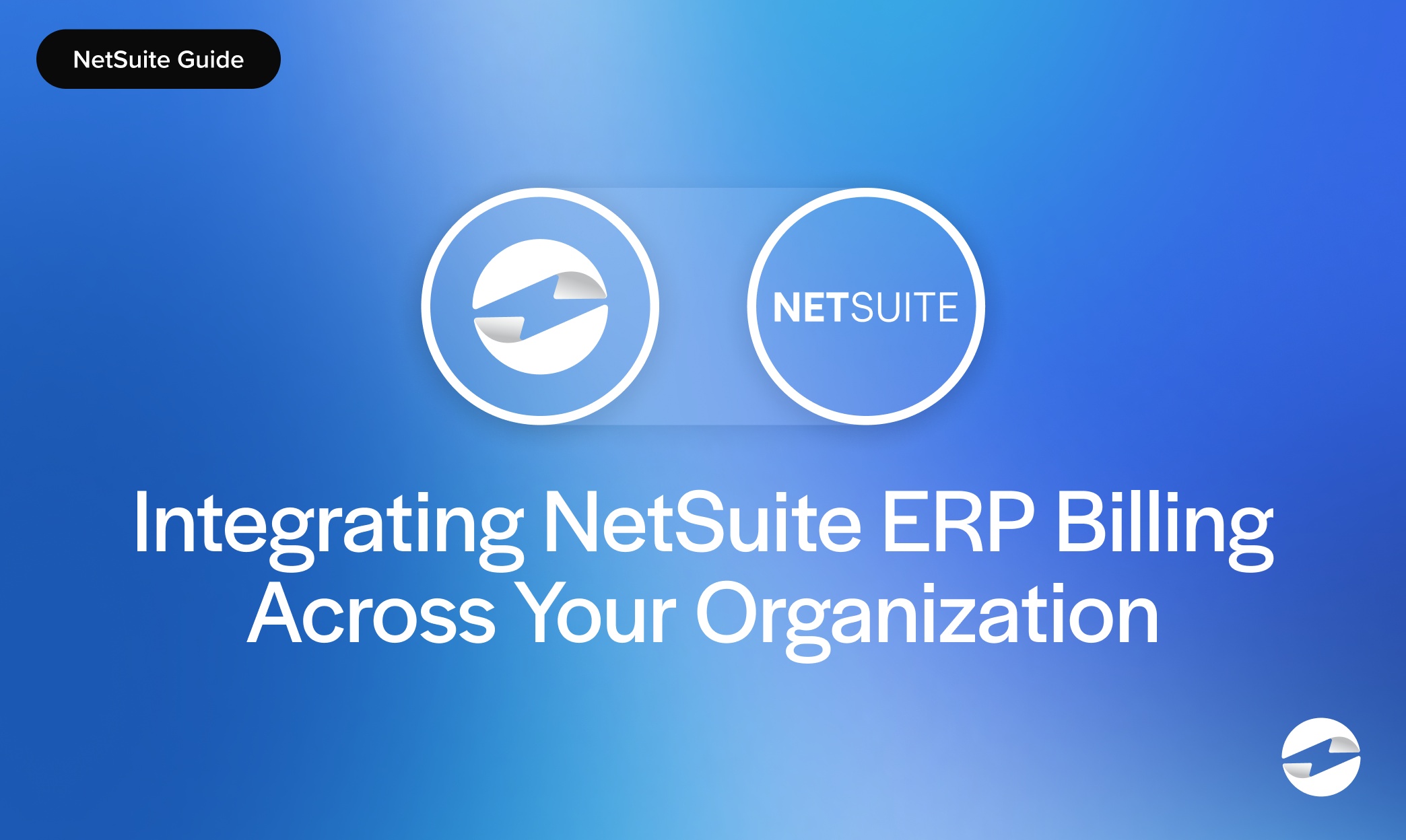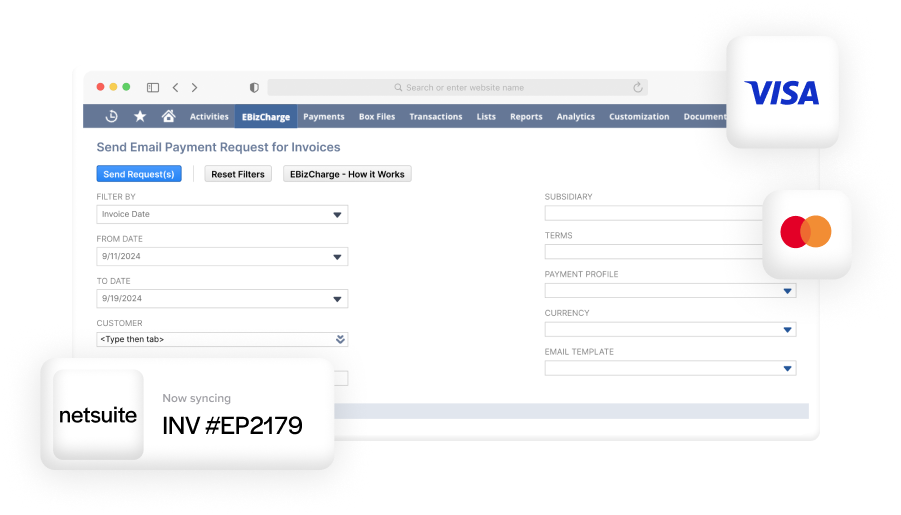Blog > Integrating NetSuite ERP Billing Across Your Organization
Integrating NetSuite ERP Billing Across Your Organization
If you’re using NetSuite enterpise resource planning (ERP), you’re already a step ahead when it comes to managing your business processes. But when it comes to billing, many organizations still deal with fragmented systems that cause delays, errors, and extra work. Integrating NetSuite ERP billing across your departments isn’t just a technical upgrade—it’s a practical way to cut down on friction, improve cash flow, and stay aligned company-wide.
This guide will walk through what NetSuite billing actually offers, why integration matters, and how to roll it out across your organization in a way that works for your real-world needs.
Understanding NetSuite ERP billing
NetSuite ERP billing isn’t just about sending invoices. It’s a full-featured billing solution that includes recurring billing, usage-based billing, and complex contract billing. Whether you’re dealing with subscription models, project-based billing, or standard product invoicing, it’s all built-in.
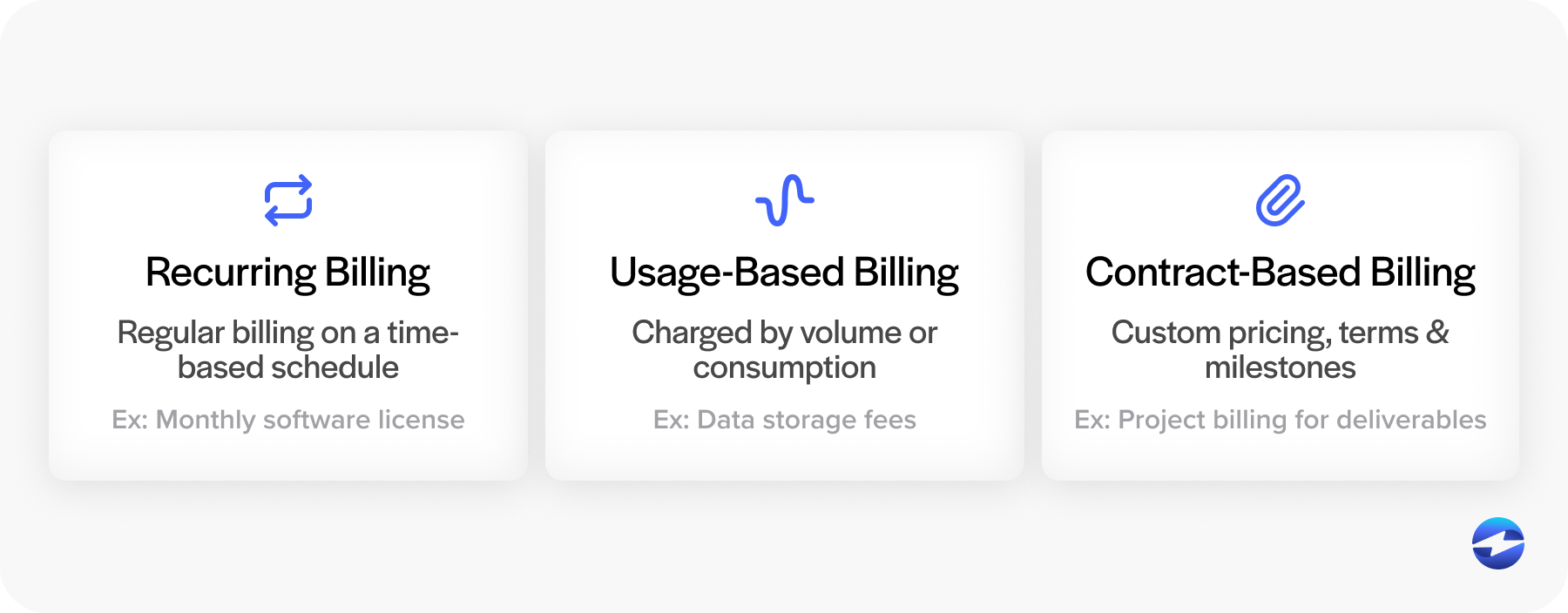
This module plays nicely with the rest of your NetSuite enterprise resource planning (ERP)—meaning your financials, sales, inventory, and customer data are all part of the same ecosystem. That kind of centralization means fewer spreadsheets, fewer manual handoffs, and more time for your team.
When billing is managed in one place, it’s easier to spot trends, catch mistakes early, and make decisions based on real-time numbers.
Why cross-department integration matters
In many companies, billing lives in its own little silo. Sales closes a deal, but finance doesn’t see the final pricing structure. Customer service answers questions about invoices they didn’t create. Operations ship products with outdated terms.
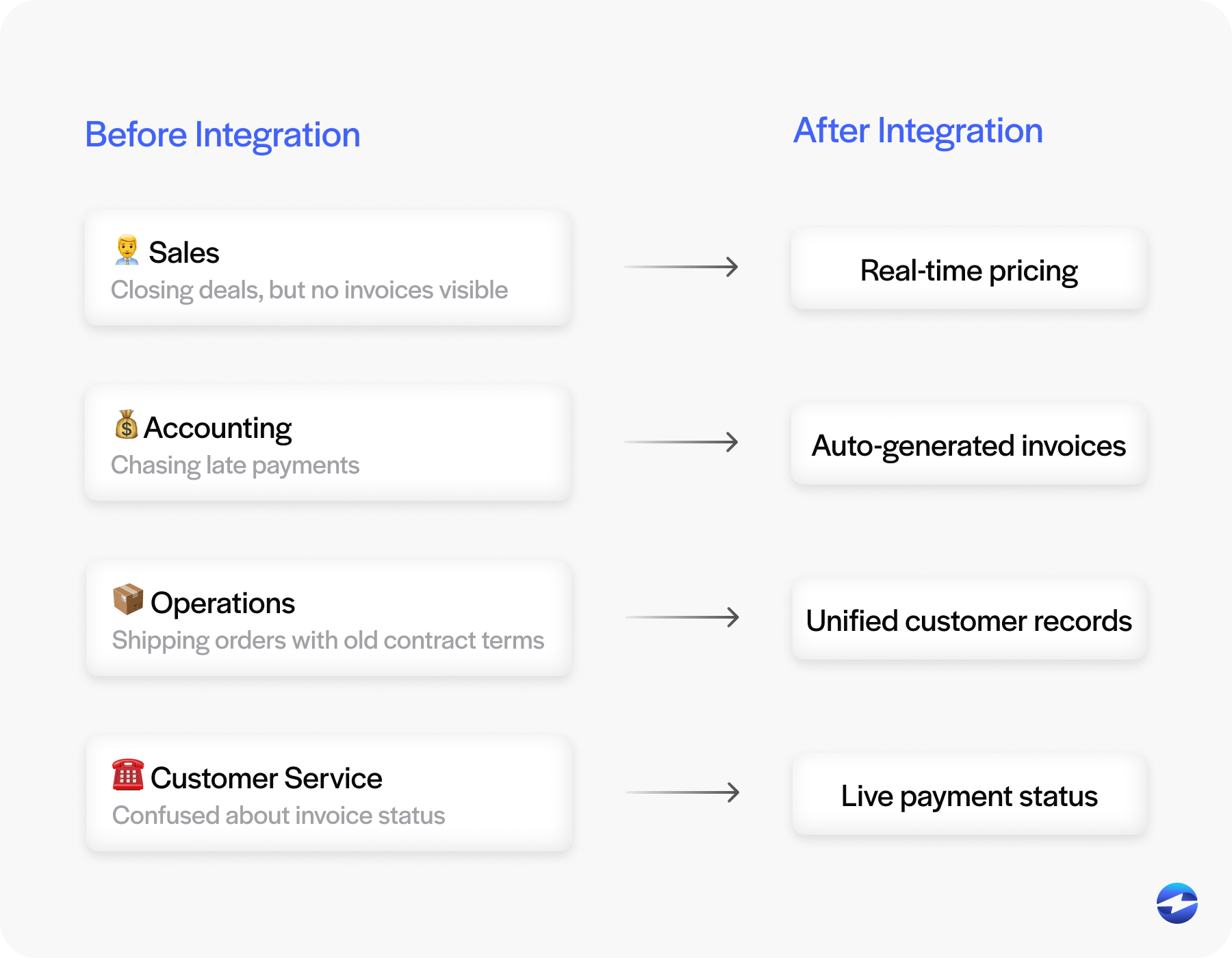
These disconnects aren’t just annoying—they cost real money. They slow down payments, create compliance risks, and confuse customers.
Departments like Sales, Finance, Customer Service, and Operations all have a role to play in how and when billing happens. Integrating NetSuite billing across those departments ensures everyone is working from the same source.
Preparing for integration
Before you jump into implementation, take stock of what you’re working with. What does your current billing process look like? Which systems touch billing today? Where do things break down?
You’ll want to pull in voices from across the company—not just IT. Sales needs timely invoicing. Finance wants accuracy and auditability. Customer service wants to speak confidently to answer invoice questions. Everyone has a stake. From there, set clear goals. Maybe you want to reduce days sales outstanding (DSO). Maybe you want invoices to go out the same day a deal closes. Maybe you want cleaner reporting. Whatever it is, define it upfront.
Integration strategies and best practices
Start by connecting your core systems. If you’re using a customer relationship management (CRM), ensure it syncs cleanly with your NetSuite ERP billing setup. Customer and transaction data should flow automatically.
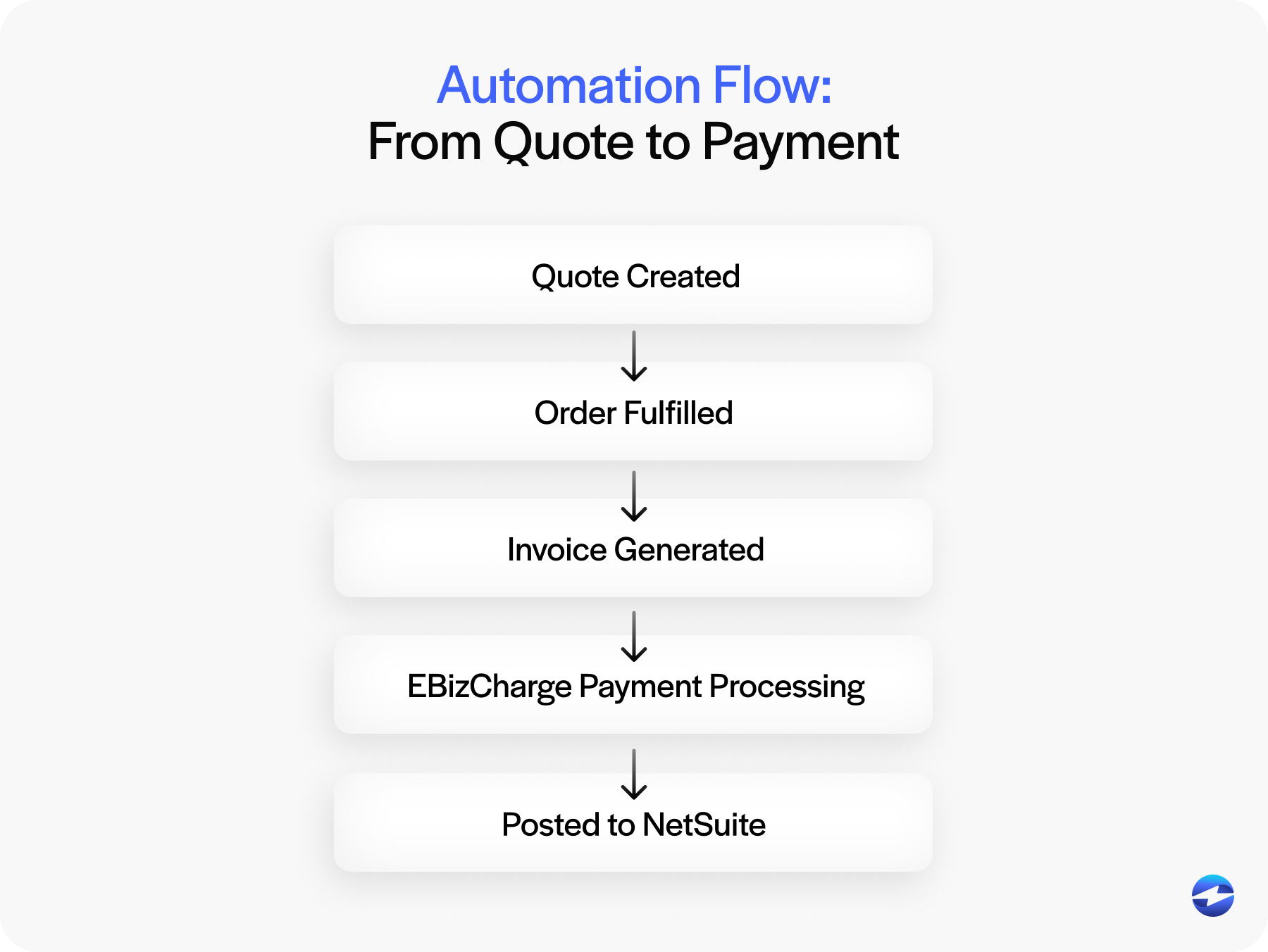
Automate wherever you can. When a quote turns into an order, and that order is fulfilled, the invoice should be generated with no manual steps. The less room for human error, the better.
NetSuite workflows and SuiteScript can help with automation. For more advanced needs, lean on APIs and certified connectors. If you’re using third-party tools or need a payment processing solution, make sure they integrate directly with NetSuite.
This is especially true for NetSuite payment processing. Choosing a compatible payment processor that supports NetSuite credit card processing is critical. Look for a payment gateway that simplifies reconciliation, offers security compliance, and allows for easy customer payments.
Real-time reporting and analytics
Once you’re integrated, the reporting possibilities really open up.
NetSuite’s reporting tools allow you to create custom dashboards that give both granular and big-picture views of your billing performance. You can track metrics like invoice cycle times, customer aging reports, collection efforts, and real-time revenue trends. These aren’t just reports for finance teams; they’re decision-making tools for every department.
For example, sales managers can monitor invoicing accuracy tied to deal terms. Finance leaders can get immediate insights into outstanding balances. Operations teams can measure fulfillment against billing schedules. With this level of visibility, each team can respond faster and work more collaboratively to keep cash flowing and customers satisfied.
Common challenges and how to overcome them
Integration isn’t always smooth sailing. Migrating billing data from other systems can reveal inconsistencies—things like mismatched customer records, outdated billing categories, or legacy invoice templates that don’t translate well to a modern system. Before you import anything into NetSuite, take time to audit and clean up your data. The goal is to start fresh with a reliable and standardized foundation.
There’s also the human side of integration to consider. Changing processes can be disruptive, even when the result is a big improvement. Train your teams thoroughly, give them opportunities to ask questions, and provide accessible documentation or support resources. The more confident they are using the new billing system, the faster your investment will pay off.
If you deal with complex billing scenarios like tiered pricing, custom contracts, or usage-based models, plan those configurations in advance and build them into your test cases. Don’t assume everything will work on the first pass. Use a sandbox environment to test thoroughly and ensure edge cases are handled correctly before rolling out company-wide.
Powering NetSuite billing with EBizCharge
Integrating NetSuite ERP billing across your organization might sound like a big lift, but the payoff is worth it. You get cleaner data, faster payments, and a more aligned team. If you’re looking for a solution that makes this process easier, EBizCharge offers a seamless integration with NetSuite that streamlines payment operations from end to end. Designed specifically for NetSuite users, EBizCharge acts as a native extension within your ERP, eliminating the need for clunky third-party gateways or duplicate data entry.
EBizCharge equips merchants with tools like automated payment collection, real-time invoice posting, and built-in NetSuite credit card processing. It also supports secure customer payment portals, robust tokenization, and PCI-compliant storage—all directly inside NetSuite. This tight integration allows for faster reconciliation, fewer errors, and more efficient cash flow management.
With EBizCharge, you’re not just adding a payment gateway, you’re plugging into a full payment processing solution that speaks the same language as your ERP billing software. It simplifies daily workflows while enhancing visibility and control over your transactions.
So, whether you’re in finance, operations, or IT, aligning your billing solution with a purpose-built integration like EBizCharge can make a measurable difference—not just for your team, but for your customers, too.
